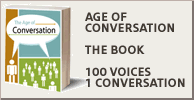For the incumbents, the "success" of these two brands accelerates and vindicates the need to rapidly move into this new territory.
Then there's the generation of young entrepreneurs looking to make it big in the second wave of the web revolution. The conference even included a "VC pitch" style showcase from an interesting mix of players. They ranged in scope, scale and sophistication, but there were some standouts:
Klostu- Bringing order to the internet's forums and groups
ODesk- An on demand global workforce- not exactly, but really good if you need programmers
Stikkit- An intelligent application designed to plug the gap between paper and the computer
Everywhere you turned, advertising was mentioned as the panacea and banker for this new generation. Everything was set to make money from advertising revenue. However, there's a problem, given that Web 2.0 is supposed to be a radical shift revolving around the integration and participation of users, how does advertising fit into this model?
Adam Gerber of Brightcove came closest in articulating the scale of change required. He talked about the new world of video content ranging in length ranging from seconds to hours and suggested that advertising too needs to break free of the constraints of its format.
One of the closing highlights of the day was John Batelle's interview with Eric Schmidt of Google. One of the most interesting parts of this discussion revolved around Google's process.
Google has a structure that encourages collective thinking, rather than command and control. According to Schmidt, this structure has been responsible for the success of the company so far.
Schmidt went on to describe how instead of dictating the latest corporate strategy from on high, the management team asked employees to go away in teams and answer 29 tough questions about the future.
Perhaps the ad agencies should take a leaf out of Google's book and spend 10% of their time thinking and developing ideas for the future. Ones that are consistent with the Web 2.0 world, understanding that strategic imperative here is to help clients get closer to their consumers. This is about applications and broad ideas, not campaigns for clients.
Juding from today's conference, it looks like the whole of Web 2.0 is waiting on the ad industry to work it out.
Photo: James Duncan Davidson/O'Reilly Media
It appears you don't have Flash installed.

Regarding the generation of young entrepreneurs of the web 2.0, there is an interesting article + video in the guardian: The web revolutionaries http://www.guardian.co.uk/video/page/0,,1942132,00.html. Worth reading it.